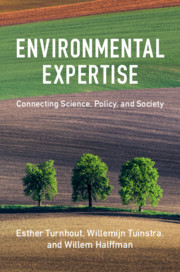Book contents
- Environmental Expertise
- Reviews
- Environmental Expertise
- Copyright page
- Contents
- Contributors
- Preface
- Abbreviations
- 1 Introduction
- 2 What Is Science? (And Why Does This Matter?)
- 3 Frames: Beyond Facts Versus Values
- Case A Framing Climate Change
- 4 Science, Politics, and the Public in Knowledge Controversies
- Case B What Does ‘Climategate’ Tell Us About Public Knowledge Controversies
- Case C Whose Deficit Anyway? Institutional Misunderstanding of Fracking-Sceptical Publics
- 5 The Limits to Knowledge
- Case D Angry Bulbs
- 6 Usable Knowledge
- Case E Expertise for European Fisheries Policy
- 7 Interdisciplinarity and the Challenge of Knowledge Integration
- Case F Knowledge Integration in the Millennium Ecosystem Assessment
- Case G Integrated Assessment for Long-Range Transboundary Air Pollution
- 8 Lay Expertise
- Case H Lay Expertise and Botanical Science
- Case I The Loweswater Care Project
- 9 Environmental Experts at the Science–Policy–Society Interface
- Case J Groupthink and Whistle Blowers in CO2 Capture and Storage
- 10 Environmental Knowledge in Democracy
- 11 Conclusion
- Index
- References
Case B - What Does ‘Climategate’ Tell Us About Public Knowledge Controversies
Published online by Cambridge University Press: 22 February 2019
- Environmental Expertise
- Reviews
- Environmental Expertise
- Copyright page
- Contents
- Contributors
- Preface
- Abbreviations
- 1 Introduction
- 2 What Is Science? (And Why Does This Matter?)
- 3 Frames: Beyond Facts Versus Values
- Case A Framing Climate Change
- 4 Science, Politics, and the Public in Knowledge Controversies
- Case B What Does ‘Climategate’ Tell Us About Public Knowledge Controversies
- Case C Whose Deficit Anyway? Institutional Misunderstanding of Fracking-Sceptical Publics
- 5 The Limits to Knowledge
- Case D Angry Bulbs
- 6 Usable Knowledge
- Case E Expertise for European Fisheries Policy
- 7 Interdisciplinarity and the Challenge of Knowledge Integration
- Case F Knowledge Integration in the Millennium Ecosystem Assessment
- Case G Integrated Assessment for Long-Range Transboundary Air Pollution
- 8 Lay Expertise
- Case H Lay Expertise and Botanical Science
- Case I The Loweswater Care Project
- 9 Environmental Experts at the Science–Policy–Society Interface
- Case J Groupthink and Whistle Blowers in CO2 Capture and Storage
- 10 Environmental Knowledge in Democracy
- 11 Conclusion
- Index
- References
Summary
- Type
- Chapter
- Information
- Environmental ExpertiseConnecting Science, Policy and Society, pp. 82 - 89Publisher: Cambridge University PressPrint publication year: 2019



